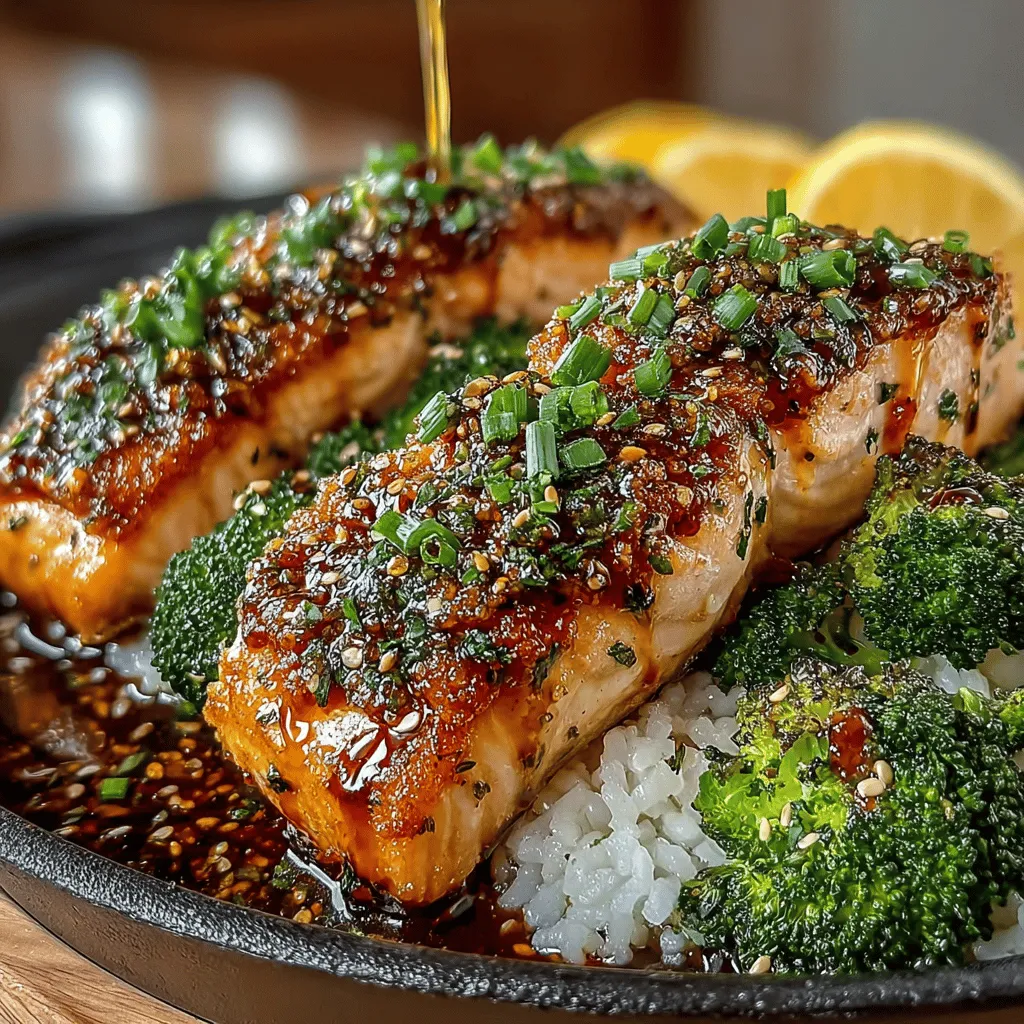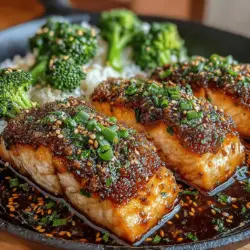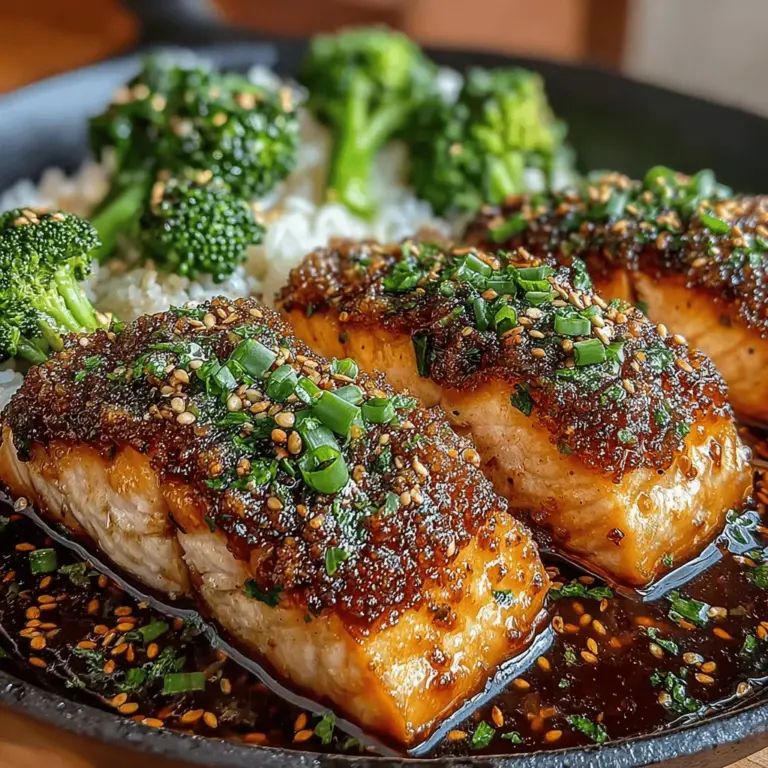One-Pan Honey Garlic Soy Salmon: A Flavor-Packed Meal
If you’re searching for a meal that combines convenience, flavor, and health benefits, look no further than One-Pan Honey Garlic Soy Salmon. This delightful dish brings together tender salmon fillets, a mouthwatering marinade, and vibrant vegetables, all cooked to perfection in a single pan. It’s the ideal solution for busy weeknights or a quick dinner party dish that will impress your guests without keeping you in the kitchen for hours.
The Appeal of a One-Pan Meal
One of the standout features of this recipe is its simplicity—everything cooks together in one pan. This not only streamlines the cooking process but also minimizes cleanup, allowing you to spend more time enjoying your meal and less time washing dishes. The one-pan approach is perfect for those who are short on time but still want a nutritious and flavorful dinner option.
A Symphony of Flavors: Sweet, Savory, and Umami
The magic of the One-Pan Honey Garlic Soy Salmon lies in its harmonious blend of flavors. The sweetness of honey complements the savory notes of soy sauce, while the fresh garlic and ginger introduce a warm, aromatic quality. This balance creates a dish that is not only satisfying to the palate but also incredibly versatile. Pair it with rice, quinoa, or a fresh salad, and you have a well-rounded meal that is sure to please.
Health Benefits of Salmon and Vegetables
Beyond its delicious taste, this recipe boasts several health benefits. Salmon is a rich source of omega-3 fatty acids, which are essential for heart health and brain function. It also provides high-quality protein, vitamins, and minerals that support overall well-being. The addition of colorful vegetables, such as broccoli, not only enhances the dish’s visual appeal but also adds fiber, vitamins, and antioxidants to your meal. By incorporating fresh ingredients, you can create a dish that nourishes both body and soul.
Understanding the Ingredients
To create the perfect One-Pan Honey Garlic Soy Salmon, it’s crucial to understand the role of each ingredient in the recipe. Here’s a closer look at the main components that make this dish a standout.
The Importance of Salmon
Salmon is the star of this recipe, known for its rich flavor and numerous health benefits. It is packed with omega-3 fatty acids, which have been shown to reduce inflammation, lower blood pressure, and support heart health. Additionally, salmon is an excellent source of high-quality protein, making it a great choice for those looking to maintain a balanced diet. When selecting salmon, opt for wild-caught varieties when possible, as they tend to be more sustainable and are often higher in nutrients compared to farmed salmon.
Why Low-Sodium Soy Sauce?
Using low-sodium soy sauce in this recipe is a smart choice for those watching their sodium intake. Regular soy sauce can be quite salty, which might overpower the other flavors in the dish. The low-sodium version allows you to enjoy the umami flavor without excessive salt. Plus, it’s easier to control the overall saltiness of the dish, making it a healthier option for everyone at the table.
The Role of Honey
Honey serves as a natural sweetener in this recipe, balancing the savory and salty elements provided by the soy sauce. In addition to enhancing flavor, honey offers several health benefits, including antibacterial properties and antioxidants. It can also help in maintaining energy levels, making it a great addition to your meals. When choosing honey, look for raw or organic varieties for the best quality.
Fresh Garlic and Ginger
The aromatic qualities of fresh garlic and ginger elevate the dish, adding layers of flavor that are both warm and invigorating. Garlic is known for its immune-boosting properties, while ginger can aid digestion and reduce inflammation. Using fresh ingredients instead of powders or pastes ensures that you capture the full essence of these flavors, resulting in a more vibrant and enjoyable dish.
The Significance of Sesame Oil
Sesame oil is another key ingredient in this recipe, lending a unique nutty flavor that enhances the overall taste profile. It is rich in healthy fats and antioxidants, contributing to heart health and overall wellness. A little goes a long way, so just a drizzle can transform the dish into something extraordinary. When selecting sesame oil, opt for toasted sesame oil for a deeper flavor that will infuse your salmon and vegetables beautifully.
Discussing the Vegetables: Broccoli and Alternatives
For this one-pan meal, we recommend using fresh broccoli, which not only adds color and texture but also packs a nutritional punch. Broccoli is high in vitamins K and C, fiber, and various antioxidants, making it an excellent choice for a healthy side. If you’re looking for alternatives, consider using snap peas, bell peppers, or asparagus, all of which will complement the salmon and soak up the delicious marinade. The versatility of this dish allows you to customize it based on your preferences or seasonal produce availability.
Preparation of the Marinade
Creating the marinade is a straightforward yet crucial step in preparing the One-Pan Honey Garlic Soy Salmon. The marinade infuses the salmon with flavor and enhances its natural richness. Here’s how to prepare it:
Ingredients for the Marinade
To create the perfect marinade for this recipe, gather the following ingredients:
– Low-sodium soy sauce
– Honey
– Fresh garlic, minced
– Fresh ginger, grated
– Sesame oil
– Optional: a splash of rice vinegar or lime juice for acidity
Step-by-Step Guide to Creating the Marinade
1. Combine Ingredients: In a small bowl, whisk together 1/4 cup of low-sodium soy sauce, 2 tablespoons of honey, 2 cloves of minced garlic, 1 tablespoon of grated ginger, and 1 teaspoon of sesame oil. If you choose to add acidity, include a splash of rice vinegar or lime juice.
2. Taste and Adjust: After mixing, taste the marinade. You can adjust the sweetness or saltiness by adding more honey or soy sauce, depending on your preference.
3. Marinate the Salmon: Place the salmon fillets in a shallow dish or a resealable bag and pour the marinade over them, ensuring they are well-coated.
Importance of Marinating for Flavor Enhancement
Marinating is essential for deepening the flavors of the salmon. Allowing it to sit in the marinade for at least 30 minutes (or up to 2 hours for maximum flavor) will help the fish absorb the sweet and savory notes, resulting in a more flavorful dish. The acids in the marinade also help tenderize the salmon, making it even more succulent.
Tips for Storage and Using Leftover Marinade
If you have leftover marinade, consider saving it for later use. You can store it in an airtight container in the refrigerator for up to a week. Just be sure to avoid using it on raw fish unless you boil it first to kill any bacteria. Alternatively, you can use it as a glaze during the cooking process for added flavor.
Marinating the Salmon
To achieve the best flavor and texture, proper marinating techniques are crucial. Here’s how to effectively marinate your salmon:
Best Practices for Marinating Salmon
– Use a Shallow Dish or Resealable Bag: A shallow dish allows for even coverage of the marinade, while a resealable bag ensures that the salmon is fully coated. If using a bag, gently massage the marinade into the fish for enhanced flavor absorption.
– Avoid Over-Marinating: While marinating is essential, be cautious not to overdo it. Marinating the salmon for too long can lead to a mushy texture. Aim for the sweet spot of 30 minutes to 2 hours.
Time Considerations for Marinating
The optimal marinating time for salmon is generally between 30 minutes to 2 hours. If you’re short on time, even a quick 30-minute marinate can make a significant difference. For deeper flavor, allow the salmon to marinate for closer to 2 hours, but avoid exceeding that time to maintain the perfect texture.
Shallow Dishes vs. Resealable Bags
Both shallow dishes and resealable bags have their advantages. A shallow dish allows you to visually check on the fish and ensures even coverage, while a resealable bag is great for easy storage and minimal cleanup. Choose the method that best fits your kitchen setup and personal preference.
With these initial steps, you are well on your way to preparing a delicious One-Pan Honey Garlic Soy Salmon that will surely become a favorite in your household. Stay tuned for the next part of this article, where we will dive into the cooking process and tips for serving this delightful dish.

Cooking Process
Preheating the Oven: Why Temperature Matters
Before diving into the delicious preparation of your One-Pan Honey Garlic Soy Salmon, it’s crucial to preheat your oven to 400°F (200°C). Preheating not only ensures that your salmon and vegetables cook evenly but also helps achieve that perfect texture. A hot oven allows the salmon to sear on the outside while remaining tender and flaky on the inside. Additionally, preheating can enhance the caramelization of the honey garlic soy glaze, creating a delightful depth of flavor.
Preparing Vegetables for Roasting: Tips for Even Cooking
While the oven is heating, turn your attention to the vegetables that will accompany the salmon. Choose a variety of colorful vegetables such as bell peppers, broccoli, and snap peas for both nutrition and visual appeal. Here are some tips to ensure even cooking:
– Uniform Size: Cut vegetables into similar sizes to promote even roasting. Larger pieces will take longer to cook, while smaller ones may burn.
– Drying: Pat vegetables dry with a paper towel after washing. Excess moisture can lead to steaming instead of roasting, which will inhibit the caramelization process.
– Tossing with Oil: Coat your vegetables lightly with olive oil and season with salt and pepper. This not only enhances flavor but also helps in achieving a crispy texture.
Arranging Ingredients in the Skillet: Aesthetics and Functionality
In a large oven-safe skillet or a baking dish, arrange the vegetables first, creating a colorful bed for the salmon. This not only enhances the aesthetics but also allows the salmon to baste in the flavors of the vegetables as they cook. Place the seasoned salmon fillets atop the vegetables, ensuring they have space between them for proper air circulation and even cooking. Remember to reserve some of the marinade for glazing the salmon later, which will amplify the flavors.
Importance of Reserving Marinade for Glazing
After marinating your salmon, set aside a portion of the marinade before placing the salmon in the skillet. This reserved marinade will be used later to glaze the salmon during baking, providing an extra layer of flavor while also ensuring that the dish remains moist. Avoid using the marinade that has come into contact with raw fish to prevent any food safety issues.
Baking the Salmon and Vegetables
Step-by-Step Baking Instructions
Once your oven is preheated and your ingredients are arranged, it’s time to bake. Follow these steps for a successful dish:
1. Place the Skillet in the Oven: Carefully transfer your skillet to the preheated oven.
2. Bake for 15-20 Minutes: Bake the salmon and vegetables for 15 to 20 minutes, depending on the thickness of your salmon fillets. The vegetables should be tender and slightly caramelized, while the salmon should be opaque and flaky.
3. Glaze Midway: After about 10 minutes, remove the skillet briefly and brush the reserved marinade over the salmon. This will add additional flavor and moisture.
The Science Behind Baking Salmon Perfectly
Baking salmon involves a delicate balance of time and temperature. Salmon is best cooked to an internal temperature of 145°F (63°C), which ensures that the fish is safe to eat while also keeping it succulent. The flesh should easily flake with a fork when done. Overcooking can lead to dryness, so keep a close eye on it in the last few minutes of cooking.
Broiling for a Crispy Finish: Guidelines and Safety Tips
For an added crispy finish, consider broiling the salmon for the last 2-3 minutes of cooking. Set your oven’s broiler to high and keep the skillet about 6 inches from the heat source. This method caramelizes the glaze, giving your salmon a beautiful golden crust. However, watch closely to avoid burning; broiling can quickly go from perfect to charred.
Signs to Look for to Ensure Salmon is Cooked Properly
To ensure your salmon is perfectly cooked, look for these signs:
– The flesh should appear opaque and should flake easily with a fork.
– The internal temperature should reach 145°F (63°C).
– If you press the salmon gently, it should feel firm but give slightly.
Garnishing and Serving Suggestions
Creative Ideas for Garnishing the Dish
Once your One-Pan Honey Garlic Soy Salmon is out of the oven, it’s time to enhance its presentation. Consider garnishing with:
– Chopped Fresh Herbs: A sprinkle of fresh cilantro or parsley adds a burst of color and freshness.
– Sesame Seeds: Toasted sesame seeds can add a nutty flavor and a pleasing crunch.
– Lime Wedges: Serve with lime wedges for a zesty touch that complements the dish’s flavors.
Recommended Side Dishes and Serving Suggestions
This dish pairs well with a variety of sides. Here are some suggestions:
– Steamed Rice: Jasmine or basmati rice serves as a perfect base to soak up the delicious glaze.
– Quinoa: For a healthier option, try serving with quinoa, which adds a nutty flavor and is high in protein.
– Mixed Greens: A light salad with a citrus vinaigrette can balance the richness of the salmon.
Discussing the Pairing of Rice or Quinoa with Salmon
Both rice and quinoa offer great nutritional benefits when served alongside salmon. Rice provides carbohydrates for energy, while quinoa adds protein and fiber, making it a well-rounded meal. Choose brown rice or quinoa for added health benefits, as they contain more nutrients compared to their white counterparts.
Suggestions for Meal Prep and Leftovers
This One-Pan Honey Garlic Soy Salmon is ideal for meal prep. Store any leftovers in an airtight container in the refrigerator for up to three days. Reheat gently in the microwave or on the stovetop to maintain its texture, or enjoy it cold in salads or wraps.
Nutritional Benefits of One-Pan Honey Garlic Soy Salmon
Breakdown of the Nutritional Content Per Serving
This dish is not only delicious but also packed with nutrients. Here’s a general breakdown of the nutritional content per serving:
– Calories: Approximately 350
– Protein: 30g
– Carbohydrates: 20g
– Fat: 15g (healthy fats from salmon and olive oil)
– Fiber: 4g (from vegetables)
Health Benefits of Incorporating Salmon into Your Diet
Salmon is rich in omega-3 fatty acids, which are known for their heart health benefits. These healthy fats can lower blood pressure and reduce inflammation, contributing to overall cardiovascular health. Additionally, salmon is a great source of high-quality protein, essential for muscle maintenance and repair.
Advantages of Eating Vegetables with Each Meal
Incorporating a variety of vegetables into your meals not only boosts flavor but also enhances nutritional intake. Vegetables are loaded with vitamins, minerals, and fiber, which are essential for maintaining good health. Eating a colorful assortment can help reduce the risk of chronic diseases and promote better digestion.
Conclusion
The One-Pan Honey Garlic Soy Salmon is a delightful dish that marries the sweetness of honey with the umami of soy sauce, creating a flavor profile that is both satisfying and nutritious. Its easy preparation method, combined with the health benefits of salmon and vegetables, makes it a perfect choice for busy weeknight dinners or meal prep.
By trying this recipe, you’re not only treating yourself to a wholesome homemade meal but also exploring the deliciousness that comes from simple, fresh ingredients. Whether you’re serving it to your family or preparing meals for the week ahead, this dish is sure to impress with its vibrant flavors and ease of preparation. Enjoy the satisfaction of a healthy, delicious meal that you can feel good about serving!


